| |

Traditions, folklore, history and more. If it's Irish, it's here. Or will be!
"People will not look forward to posterity who never look backward to their ancestors."
-Edmund Burke




Quotes
Library: Books, Movies, Music
Prints & Photos
Poetry
Jokes


Shops Ireland
Bunús na Gaeilge
(Basic Irish)
Circle of Prayer
Blessings
Did You Know?
Himself/Herself
Write to Us
Readers Write..
Links/Link to Us
Advertise with us
Awards & Testimonials
Submissions Guide

Help keep us free
Throughout the site you will see many items available for purchase from well-known merchants such as Amazon. Not interested in what we're featuring? It doesn't matter. Click on any link and then shop for whatever you wish - we will still get credit, if you buy something.
Thanks for your help.
|
|
|
Index of All Children's Stories
Kids' Ireland Library
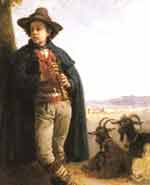 The Young King The Young King
By Oscar Wilde
Edited and adapted by Bridget Haggerty*
Note: Why did we edit it? Oscar, as we all know, was a master of the language and had an enormous vocabulary. To help the parents reading this story to their children we felt it was necessary to simplify some of Oscar's writing.
This avoids the need to run for the dictionary every few minutes (also, it's pretty scary as Oscar did it).
It was the night before the day of his coronation, and the young King was sitting alone in his beautiful chamber. His courtiers had all taken their leave of him. The lad - for he was only a lad, being but twelve years of age - was not sorry at their departure, and had flung himself back with a deep sigh of relief on the soft cushions of his embroidered couch, lying there, wild-eyed like a brown woodland Faun, or some young animal of the woodlands newly snared by the hunters.
And, indeed, it was the hunters who had found him, coming upon him almost by chance as he was following the flock of the poor goat-herd who had brought him up, and whose son he had always fancied himself to be.
In truth, he was the child of the old King's only daughter by a secret marriage with one much beneath her in station. When the child was but a week old,he had been stolen away from his mother's side as she slept and given into the charge of a common peasant and his wife, who were without children of their own, and lived in a remote part of the woods, more than a day's ride from the town.
Grief, or the plague, as the court physician stated, or, as some suggested, a swift poison administered in a cup of spiced wine, slew, within an hour of her wakening, the princess who had given the young King birth, and as the trusty messenger who bore the child across his saddle stooped from his weary horse and knocked at the rude door of the goatherd's hut, the body of the Princess was being lowered into an open grave that had been dug in a deserted churchyard, beyond the city gates, a grave where, it was said, another body was also lying; that of a young man of marvellous and foreign beauty who appeared to have been violently slain.
Such, at least, was the story that men whispered to each other. Certain it was that the old King, when on his death-bed, whether moved by remorse for his great sin, or merely desiring that the kingdom should not pass away from his line, had had the lad sent for, and, in the presence of the Council, had acknowledged him as his heir.
And it seems that from the very first moment of his recognition he had shown signs of that strange passion for beauty that was destined to have so great an influence over his life.
Those who accompanied him to his suite of rooms often spoke of the cry of pleasure that broke from his lips when he saw the delicate raiment and rich jewels that had been prepared for him, and of the almost fierce joy with which he flung aside his coarse peasant clothes.
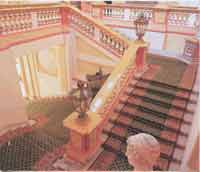 At times he missed the fine freedom of his forest life, and was often annoyed at the tedious Court ceremonies that occupied so much of each day, but the wonderful palace in which he now found himself seemed to him to be a new world fresh-fashioned for his delight; and as soon as he could escape from the council-board or audience-chamber, he would run down the great staircase and wander from room to room, and from corridor to corridor. At times he missed the fine freedom of his forest life, and was often annoyed at the tedious Court ceremonies that occupied so much of each day, but the wonderful palace in which he now found himself seemed to him to be a new world fresh-fashioned for his delight; and as soon as he could escape from the council-board or audience-chamber, he would run down the great staircase and wander from room to room, and from corridor to corridor.
All rare and costly materials had a great fascination for him, and in his eagerness to procure them he sent away many merchants, some to traffic for amber with the rough fisher-folk of the north seas, some to Egypt to look for that curious green turquoise which is found only in the tombs of kings, and is said to possess magical properties, some to Persia for silken carpets and painted pottery, and others to India to buy gauze and stained ivory, moonstones and bracelets of jade, sandalwood and blue enamel and shawls of fine wool.
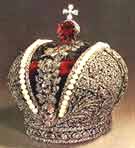 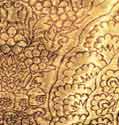 But what had occupied him most was the robe he was to wear at his coronation, the robe of tissued gold, and the ruby-studded crown, and the sceptre with its rows and rings of pearls. Indeed, it was of this that he was thinking to-night, as he lay back on his luxurious couch, watching the great pinewood log that was burning itself out on the open hearth. The designs, which were from the hands of the most famous artists of the time, had been submitted to him many months before, and he had given orders that the jewelers were to toil night and day to carry them out, and that the whole world was to be searched for jewels that would be worthy of their work. But what had occupied him most was the robe he was to wear at his coronation, the robe of tissued gold, and the ruby-studded crown, and the sceptre with its rows and rings of pearls. Indeed, it was of this that he was thinking to-night, as he lay back on his luxurious couch, watching the great pinewood log that was burning itself out on the open hearth. The designs, which were from the hands of the most famous artists of the time, had been submitted to him many months before, and he had given orders that the jewelers were to toil night and day to carry them out, and that the whole world was to be searched for jewels that would be worthy of their work.
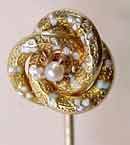 He saw himself in fancy standing at the high altar of the cathedral in the fair raiment of a King, and a smile played and lingered about his boyish lips, and lit up with a bright lustre his dark woodland eyes. He saw himself in fancy standing at the high altar of the cathedral in the fair raiment of a King, and a smile played and lingered about his boyish lips, and lit up with a bright lustre his dark woodland eyes.
After some time he rose from his seat. Outside he could see the huge dome of the cathedral. Far away, in an orchard, a nightingale was singing. A faint perfume of jasmine came through the open window. He brushed his brown curls back from his forehead, and taking up a lute, let his fingers stray across the cords. His heavy eyelids drooped, and a strange but wonderful weariness came over him. Never before had he felt so keenly, or with such exquisite joy, the magic and the mystery of beautiful things.
When midnight sounded from the clock-tower he touched a bell, and his pages entered and disrobed him with much ceremony, pouring rose-water over his hands, and strewing flowers on his pillow. A few moments after that they had left the room, he fell asleep. And as he slept he dreamed a dream, and this was his dream.
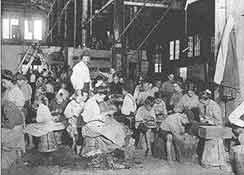 He thought that he was standing in a long, low attic, amidst the whirr and clatter of many looms. The meagre daylight peered in through the grated windows, and showed him the gaunt figures of the weavers bending over their cases. Their faces were pinched with famine, and their thin hands shook and trembled. Some haggard women were seated at a table sewing. A horrible smell filled the place. The air was heavy, and the walls dripped with damp. He thought that he was standing in a long, low attic, amidst the whirr and clatter of many looms. The meagre daylight peered in through the grated windows, and showed him the gaunt figures of the weavers bending over their cases. Their faces were pinched with famine, and their thin hands shook and trembled. Some haggard women were seated at a table sewing. A horrible smell filled the place. The air was heavy, and the walls dripped with damp.
The young King went over to one of the weavers, and stood by him and watched him. And the weaver looked at him angrily, and said, 'Why art thou watching me? Art thou a spy set on us by our master?' 'Who is thy master?' asked the young King. 'Our master!' cried the weaver, bitterly. 'He is a man like myself. Indeed, there is but this difference between us that he wears fine clothes while I go in rags, and that while I am weak from hunger he suffers not a little from overfeeding.' 'The land is free,' said the young King, 'and thou art no man's slave.'
'In war,' answered the weaver, 'the strong make slaves of the weak, and in peace the rich make slaves of the poor. We must work to live, and they give us such mean wages that we die. We toil for them all day long, and they heap up gold in their coffers We have chains, though no eye beholds them; and are slaves, though men call us free.'
'Is it so with all?' he asked. 'It is so with all,' answered the weaver, 'with the young as well as with the old, with the women as well as with the men, with the little children as well as with those who are stricken in years. The merchants grind us down, and we must needs do their bidding. But what are these things to thee? Thou art not one of us. Thy face is too happy.' And he turned away scowling, and threw the shuttle across the loom, and the young King saw that it was threaded with a thread of gold.
And a great terror seized upon him, and he said to the weaver, 'What robe is this that thou art weaving?' 'It is the robe for the coronation of the young King,' he answered; 'what is that to thee?'
And the young King gave a loud cry and woke, and lo! he was in his own chamber, and through the window he saw the great honey-coloured moon hanging in the dusky air. And he fell asleep again and dreamed, and this was his dream.
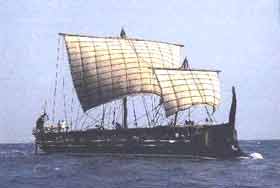 He thought that he was lying on the deck of a huge galley that was being rowed by a hundred slaves. On a carpet by his side the master of the galley was seated. He was black as ebony, and his turban was of crimson silk. Great earrings of silver dragged down the thick lobes of his ears, and in his hands he had a pair of ivory scales. He thought that he was lying on the deck of a huge galley that was being rowed by a hundred slaves. On a carpet by his side the master of the galley was seated. He was black as ebony, and his turban was of crimson silk. Great earrings of silver dragged down the thick lobes of his ears, and in his hands he had a pair of ivory scales.
The slaves were naked, but for a ragged loincloth, and each man was chained to his neighbour. The hot sun 'beat brightly upon them, and guards ran up and down the gangway and lashed them with whips of hide. They stretched out their lean arms and pulled the heavy oars through the water. The salt spray flew from the blades.
 At last they reached a little bay, and began to take soundings. A light wind blew from the shore, and covered the deck and the great sail with a fine red dust. As soon as they had cast anchor and hauled down the sail, the guards went into the hold and brought up a long rope-ladder, heavily weighted with lead. The master of the galley threw it over the side, making the ends fast to two iron stanchions. Then the guards seized the youngest of the slaves and filled his nostrils and his ears with wax, and tied a big stone round his waist. He crept wearily down the ladder, and disappeared into the sea. A few bubbles rose where he sank. Some of the other slaves peered curiously over the side. At the prow of the galley sat a shark-charmer, beating monotonously upon a drum. At last they reached a little bay, and began to take soundings. A light wind blew from the shore, and covered the deck and the great sail with a fine red dust. As soon as they had cast anchor and hauled down the sail, the guards went into the hold and brought up a long rope-ladder, heavily weighted with lead. The master of the galley threw it over the side, making the ends fast to two iron stanchions. Then the guards seized the youngest of the slaves and filled his nostrils and his ears with wax, and tied a big stone round his waist. He crept wearily down the ladder, and disappeared into the sea. A few bubbles rose where he sank. Some of the other slaves peered curiously over the side. At the prow of the galley sat a shark-charmer, beating monotonously upon a drum.
After some time the diver rose up out of the water, and clung panting to the ladder with a pearl in his right hand. The guards took it from him, and thrust him back. The slaves fell asleep over their oars.
Again and again he came up, and each time that he did so he brought with him a beautiful pearl. The master of the galley weighed them, and put them into a little bag of green leather.
The young King tried to speak, but his tongue seemed to cleave to the roof of his mouth, and his lips refused to move. The guards chattered to each other, and began to quarrel over a string of bright beads. Two cranes flew round and round the vessel.
Then the diver came up for the last time, and the pearl that he brought with him was fairer than all the pearls of Ormuz, for it was shaped like the full moon, and whiter than the morning star. But his face was strangely pale, and as he fell upon the deck the blood gushed from his ears and nostrils. He quivered for a little, and then he was still. The black men shrugged their shoulders, and threw the body overboard.
And the master of the galley laughed, and, reaching out, he took the pearl, and when he saw it he pressed it to his forehead and bowed. 'It shall be,' he said, 'for the sceptre of the young King,' and he made a sign to the black men to draw up the anchor.
And when the young King heard this he gave a great cry, and woke, and through the window he saw the long grey fingers of the dawn clutching at the fading stars. And he fell asleep again, and dreamed, and this was his dream.
He thought that he was wandering through a dim wood, hung with strange fruits and with beautiful poisonous flowers. The snakes hissed at him as he went by, and the bright parrots flew screaming from branch to branch. Huge tortoises lay asleep upon the hot mud. The trees were full of apes and peacocks.
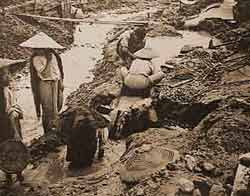 On and on he went, till he reached the outskirts of the wood, and there he saw an immense multitude of men toiling in the bed of a dried-up river. They swarmed up the crag like ants. They dug deep pits in the ground and went down into them. Some of them cleft the rocks with great axes; others grabbled in the sand. They tore up the cactus by its roots, and trampled on the scarlet blossoms. They hurried about, calling to each other, and no man was idle. On and on he went, till he reached the outskirts of the wood, and there he saw an immense multitude of men toiling in the bed of a dried-up river. They swarmed up the crag like ants. They dug deep pits in the ground and went down into them. Some of them cleft the rocks with great axes; others grabbled in the sand. They tore up the cactus by its roots, and trampled on the scarlet blossoms. They hurried about, calling to each other, and no man was idle.
From the darkness of a cavern, Death and Greed watched them, and Death said, 'I am weary; give me a third of them and let me go.' But Greed shook her head. 'They are my servants,' she answered. And Death said to her, 'What hast thou in thy hand?' 'I have three grains of corn,' she answered; 'what is that to thee?' 'Give me one of them,' cried Death, 'to plant in my garden; only one of them, and I will go away.' 'I will not give thee anything,' said Greed and she hid her hand in the fold of her raiment.
And Death laughed, and took a cup, and dipped it into a pool of water, and out of the cup rose a terrible pestilence. It passed through the great multitude of men and a third of them lay dead.
And when Greed saw that a third of the multitude was dead she beat her breast and wept. She beat her barren bosom and cried aloud. 'Thou hast slain a third of my servants,' she cried, 'get thee gone. What is this valley to thee, that thou should'st tarry in it? Get thee gone, and come here no more.
'Nay,' answered Death, 'but till thou hast given me a grain of corn I will not go.' But Greed shut her hand, and clenched her teeth. 'I will not give thee anything,' she muttered.
And Death laughed, and took up a black stone, and threw it into the forest, and out of a thicket of wild hemlock came fever in a robe of flame. The fever passed through the multitude, and touched them, and each man that it touched died.
And Greed shuddered, and put ashes on her head. 'Thou art cruel,' she cried; there is pestilence and fever all over the world Get thee gone to other places and leave me my servants.'
'Nay,' answered Death, 'but till thou hast given me a grain of corn I will not go.' 'I will not give thee anything,' said Greed.'
And Death laughed again, and he whistled through his fingers, and an evil spirit came flying through the air. Plague was written upon its forehead, and a crowd of lean vultures wheeled round it. The spirit covered the valley with its wings, and no man was left alive.
And Greed fled shrieking through the forest, and Death leaped upon his red horse and galloped away, and his galloping was faster than the wind. And out of the slime at the bottom of the valley crept dragons and horrible things with scales, and the jackals came trotting along the sand, sniffing up the air with their nostrils.
And the young King wept, and said: 'Who were these dead men and for what were they seeking?' 'For rubies for a king's crown,' answered one who stood behind him. And the young King started, and, turning round, he saw a man dressed as a pilgrim and holding in his hand a mirror of silver. And he grew pale, and said: 'For what king?' And the pilgrim answered: 'Look in this mirror, and thou shalt see him.' And he looked in the mirror, and, seeing his own face, he gave a great cry and woke, and the bright sunlight was streaming into the room, and from the trees of the garden the birds were singing.
And the Chamberlain and the high officers of State came in and made obeisance to him, and the pages brought him the robe of tissued gold, and set the crown and the sceptre before him.
And the young King looked at them, and they were beautiful. More beautiful were they than aught that he had ever seen. But he remembered his dreams, and he said to his lords: 'Take these things away, for I will not wear them.'
And the courtiers were amazed, and some of them laughed, for they thought that he was jesting.
But he spake sternly to them again, and said: 'Take these things away, and hide them from me. Though it be the day of my coronation, I will not wear them. For on the loom of Sorrow, and by the white hands of Pain, has this my robe been woven. There is Blood in the heart of the ruby, and Death in the heart of the pearl.' And he told them his three dreams.
And when the courtiers heard them they looked at each other and whispered, saying: 'Surely he is mad; for what is a dream but a dream, and a vision but a vision? They are not real things that one should heed them. And what have we to do with the lives of those who toil for us?
And the Chamberlain spake to the young King, and said, 'My lord, I pray thee set aside these black thoughts of thine, and put on this fair robe, and set this crown upon thy head. For how shall the people know that thou art a king, if thou hast not a king's raiment?'
And the young King looked at him. 'Is it so, indeed?' he questioned. 'Will they not know me for a king if I have not a king's raiment?'
'They will not know thee, my lord,' cried the Chamberlain. 'I had thought that there had been men who were kinglike,' he answered, 'but it may be as thou sayest. And yet I will not wear this robe, nor will I be crowned with this crown, but even as I came to the palace so will I go forth from it.'
And he bade them all leave him, save one page whom he kept as his companion. Him he kept for his service, and when he had bathed himself in clear water, he opened a great painted chest, and from it he took the peasant clothes that he had worn when he had watched on the hillside the shaggy goats of the goatherd. These he put on, and in his hand he took his rude shepherd's staff.
And the little page opened his big blue eyes in wonder, and said smiling to him, 'My lord, I see thy robe and thy sceptre, but where is thy crown?' And the young King plucked a spray of wild briar that was climbing over the balcony, and bent it, and made a circlet of it, and set it on his own head. 'This shall be my crown,' he answered.
And thus attired he passed out of his chamber into the Great Hall, where the nobles were waiting for him. And the nobles made merry, and some of them cried out to him, 'My lord, the people wait for their king, and thou showest them a beggar,' and others were wroth and said, 'He brings shame upon our state, and is unworthy to be our master.' But he answered them not a word, but passed on, and went down the bright porphyry staircase, and out through the gates of bronze, and mounted upon his horse, and rode towards the cathedral, the little page running beside him.
And the people laughed and said, 'It is the King's fool who is riding by,' and they mocked him. And he drew rein and said, 'Nay, but I am the King.' And he told them his three dreams.
And a man came out of the crowd and spake bitterly to him, and said, 'Sir, knowest thou not that out of the luxury of the rich cometh the life of the poor? To toil for a hard master is bitter, but to have no master to toil for is more bitter still. Thinkest thou that the ravens will feed us?
'Are not the rich and the poor brothers?' asked the young King. 'Aye,' answered the man, 'and the name of the rich brother is Cain.' And the young King's eyes filled with tears, and he rode on through the murmurs of the people, and the little page grew afraid and left him.
And when he reached the great portal of the cathedral, the soldiers thrust their halberts out and said, 'What dost thou seek here? None enters by this door but the King.'
And his face flushed with anger, and he said to them, 'I am the King,' and waved their halberts aside and passed in.
 And when the old Bishop saw him coming in his goatherd's dress, he rose up in wonder from his throne, and went to meet him, and said to him, 'My son, is this a king's apparel? And with what crown shall I crown thee, and what sceptre shall I place in thy hand? Surely this should be to thee a day of joy, and not a day of abasement.' And when the old Bishop saw him coming in his goatherd's dress, he rose up in wonder from his throne, and went to meet him, and said to him, 'My son, is this a king's apparel? And with what crown shall I crown thee, and what sceptre shall I place in thy hand? Surely this should be to thee a day of joy, and not a day of abasement.'
'Shall Joy wear what Grief has fashioned?' said the young King. And he told him his three dreams.
And when the Bishop had heard them he knit his brows, and said, 'My son, I am an old man, and in the winter of my days, and I know that many evil things are done in the wide world. The fierce robbers come down from the mountains, and carry off the little children, and sell them to the Moors. The lions lie in wait for the caravans, and leap upon the camels. The wild boar roots up the corn in the valley, and the foxes gnaw the vines upon the hill. The pirates lay waste the sea-coast and burn the ships of the fishermen, and take their nets from them. In the salt-marshes live the lepers; they have houses of wattled reeds, and none may come nigh them. The beggars wander through the cities, and eat their food with the dogs. Canst thou make these things not to be? Wilt thou take the leper for thy bedfellow, and set the beggar at thy board? Shall the lion do thy bidding, and the wild boar obey thee? Is not He who made misery wiser than thou art? Wherefore I praise thee not for this that thou hast done, but I bid thee ride back to the Palace and make thy face glad, and put on the raiment that beseemeth a king, and with the crown of gold I will crown thee, and the sceptre of pearl will I place in thy hand. And as for thy dreams, think no more of them. The burden of this world is too great for one man to bear, and the world's sorrow too heavy for one heart to suffer.'
'Sayest thou that in this house?' said the young King, and he strode past the Bishop, and climbed up the steps of the altar, and stood before the image of Christ.
He stood before the image of Christ, and on his right hand and on his left were the marvellous vessels of gold, the chalice with the yellow wine, and the vial with the holy oil. He knelt before the image of Christ, and the great candles burned brightly by the jewelled shrine, and the smoke of the incense curled in thin blue wreaths through the dome. He bowed his head in prayer, and the priests in their stiff copes crept away from the altar.
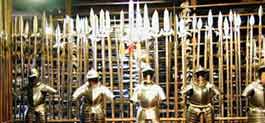 And suddenly a wild tumult came from the street outside, and in entered the nobles with drawn swords and nodding plumes, and shields of polished steel. 'Where is this dreamer of dreams?' they cried. 'Where is this King, who is apparelled like a beggar - this boy who brings shame upon our state? Surely we will slay him, for he is unworthy to rule over us.' And suddenly a wild tumult came from the street outside, and in entered the nobles with drawn swords and nodding plumes, and shields of polished steel. 'Where is this dreamer of dreams?' they cried. 'Where is this King, who is apparelled like a beggar - this boy who brings shame upon our state? Surely we will slay him, for he is unworthy to rule over us.'
And the young King bowed his head again, and prayed, and when he had finished his prayer he rose up, and turning round he looked at them sadly.
And lo! through the painted windows came the sunlight streaming upon him, and the sunbeams wove round him a tissued robe that was fairer than the robe that had been fashioned for his pleasure. The dead staff blossomed, and bore lilies that were whiter than pearls. The dry thorn blossomed, and bore roses that were redder than rubies. Whiter than fine pearls were the lilies, and their stems were of bright silver. Redder than rubies were the roses, and their leaves were of beaten gold.
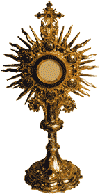 He stood there in the raiment of a king, and the gates of the jewelled shrine flew open, and from the crystal of the many-rayed receptacle which was the home of the Holy Host shone a marvellous and mystical light. He stood there in a king's raiment, and the Glory of God filled the place, and the saints in their carven niches seemed to move. In the fair raiment of a king he stood before them, and the organ pealed out its music, and the trumpeters blew upon their trumpets, and the singing boys sang. He stood there in the raiment of a king, and the gates of the jewelled shrine flew open, and from the crystal of the many-rayed receptacle which was the home of the Holy Host shone a marvellous and mystical light. He stood there in a king's raiment, and the Glory of God filled the place, and the saints in their carven niches seemed to move. In the fair raiment of a king he stood before them, and the organ pealed out its music, and the trumpeters blew upon their trumpets, and the singing boys sang.
And the people fell upon their knees in awe, and the nobles sheathed their swords and did homage, and the Bishop's face grew pale, and his hands trembled. 'A greater than I hath crowned thee,' he cried, and he knelt before him.
And the young King came down from the high altar, and passed home through the midst of the people. But no man dared look upon his face, for it was like the face of an angel.
Edited and adapted for young readers by Bridget Haggerty. If you would like to read the story as it was originally written, please click The Young King.
Images:
The Peasant Boy by Isidore Pils
Crown with Rubies
Slave Galley
Ruby Miners
Children of the cotton mills
Sweatshop
Palace Staircase
Pearl Diving - American Museum of Natural History
Gold fabric
Bishop
Sceptre
Monstrance (receptacle in which the host is held)
Any purchase made helps to support our site (and the Irish Culture & Customs fairytale). Thank you.
|
|
 Dogs of Ireland - the Kerry Blue Terrier Dogs of Ireland - the Kerry Blue Terrier
Kerry Blue Terriers were developed over 300 years ago by Irish shepherds. Their name comes from the county of Kerry in south-western Ireland.
Gentle, lovable and intelligent they are very hard working. They can herd sheep and cattle, hunt for rats and other vermin and they are good retrievers.
When they are born, they are black. As they get older, their curly coats change to red, brown or gray and then finally to bluish-grey.
Outgoing and friendly towards their family, they are known to give big, slurpy kisses. But they are also very protective and make good guard dogs as well as excellent family pets.
Resource: Puppy Dog Web.
Click for More Culture Corner.
|
"No man ever wore a cravat as nice, as his own child's arm around his neck."
- Irish Proverb
|
|
In Ireland in the 1780s, a young boy and girl who find a wolf's den in the forest vow to protect the animals from the superstitious townspeople and the greed of the hunters. Rave reviews including this one from Booklist:
"Convincing characters, tense action, and powerful conflicts makethis book an outstanding choice."
To learn more or to purchase, please click The Last Wolf in ireland.
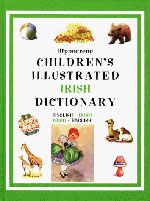
Children's Irish Dictionary
by Hippocrene Books
As a total beginner in Irish, this has taught me quite a few words. The illustrations are beautifully done, and best of all, each word is given a rough English spelling of its pronunciation. Edited from an amazon review.
Click here for Kid's Irish Dictionary.
A lovely collection of well known Irish songs from the turn of the twentieth century. This album was created as a gift to MaryLee's Nana, Rose Burke Duval. The first half are songs well known to grandparents and the second half are original and traditional songs for children.
Click here for Irish Songs.
|
|
|




 Dogs of Ireland - the Kerry Blue Terrier
Dogs of Ireland - the Kerry Blue Terrier